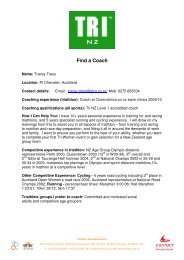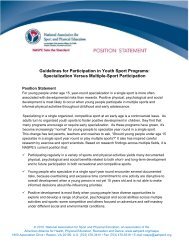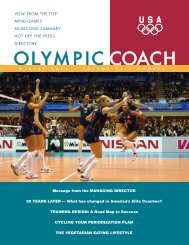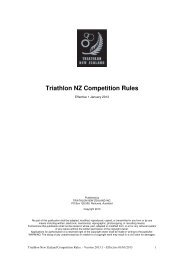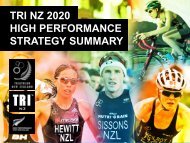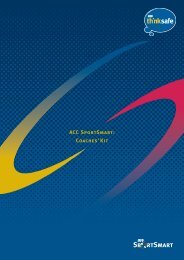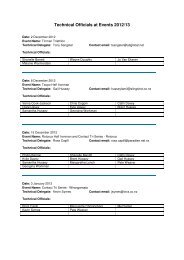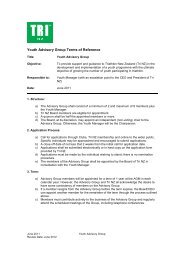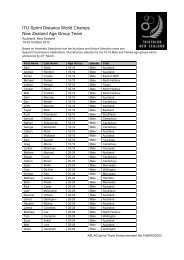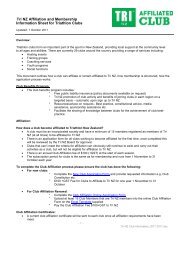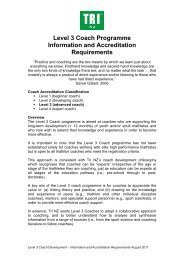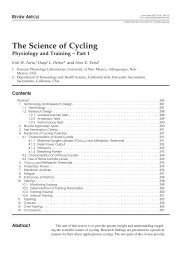Coach Tracking Study(PDF) - sports coach UK
Coach Tracking Study(PDF) - sports coach UK
Coach Tracking Study(PDF) - sports coach UK
Create successful ePaper yourself
Turn your PDF publications into a flip-book with our unique Google optimized e-Paper software.
COACH<br />
TRACKING<br />
STUDY<br />
A four-year study of <strong>coach</strong>ing in the <strong>UK</strong>
COACH TRACKING STUDY<br />
Contents<br />
Executive Summary ..................................................................1<br />
Meet Joe......................................................................................2<br />
The Importance of <strong>Coach</strong>es to Clubs and Participation ......3<br />
The Changing Motivations of a Developing <strong>Coach</strong> ..............4<br />
Supplementing <strong>Coach</strong>ing Knowledge ....................................6<br />
A Drift to Informal Learning..................................................10<br />
A Manifesto to Improve Support to <strong>Coach</strong>es......................14<br />
Tales of the Unexpected – the Exit from <strong>Coach</strong>ing ...........16<br />
Appendix 1: A Profile of <strong>Coach</strong>es in this <strong>Study</strong>..................17<br />
Appendix 2: Methodology .....................................................21<br />
90766:22 © The National <strong>Coach</strong>ing Foundation, 2012. Designed and produced by <strong>Coach</strong>wise Limited. All images © Alan Edwards unless otherwise stated.
COACH TRACKING STUDY<br />
© Action Images Limited/Reuters<br />
1 Executive Summary<br />
This report is based on a unique<br />
four-year study of <strong>coach</strong>es in the<br />
United Kingdom. Each year, over 400<br />
<strong>coach</strong>es completed a survey, providing<br />
details on their <strong>coach</strong>ing practice,<br />
professional development and motivations.<br />
We have used this data to better understand<br />
<strong>coach</strong>es and track their changes over time.<br />
The <strong>coach</strong>es in this study represent a distinct section<br />
of the national <strong>coach</strong>ing population. They are better<br />
qualified and more experienced than average and could<br />
easily be referred to as the core of any <strong>coach</strong>ing<br />
workforce. As such, their views on <strong>coach</strong>ing are worth<br />
listening to and acting upon.<br />
Below are six points to take away from this report:<br />
1 <strong>Coach</strong>es play a vital role in participation. The 417<br />
<strong>coach</strong>es in this study alone provided <strong>coach</strong>ing to<br />
over 13,000 participants. As club membership<br />
increased, it was often these <strong>coach</strong>es who stepped in<br />
to fill the <strong>coach</strong>ing gaps.<br />
2 Although <strong>coach</strong>es often have very practical reasons<br />
for starting <strong>coach</strong>ing (eg there was no one else<br />
available to do it), as they develop, they experience a<br />
range of different and more personal benefits.<br />
There is the satisfaction that comes from seeing<br />
athletes develop and a feeling of giving something<br />
back to the sport/club/community.<br />
3 <strong>Coach</strong>ing allows people to stay involved in their<br />
sport. It provides a social interaction with players<br />
and, for some, provides a continuing involvement in<br />
the competitive element of sport.<br />
4 As <strong>coach</strong>es gain more experience, they start to<br />
supplement their technical and tactical knowledge<br />
with more interpersonal and reflection skills. There is<br />
also a drift towards more informal learning sources,<br />
which reflects the different knowledge being sought.<br />
5 There is a depressing trend in <strong>coach</strong>es feeling less<br />
supported by their governing body of sport and<br />
national partners. While the majority still feel<br />
supported, if this trend is allowed to continue, we will<br />
reach a stage where, by the end of what has been<br />
called a decade of sport, less than half of<br />
experienced, qualified <strong>coach</strong>es feel supported.<br />
6 The decision to stop <strong>coach</strong>ing is rarely planned in<br />
advance. Eight out of 10 <strong>coach</strong>es who stop <strong>coach</strong>ing<br />
did not intend to do so the previous year.<br />
NEXT STEPS<br />
This report provides information on themes<br />
that emerged from the research. The next<br />
step will be to create a series of detailed<br />
reports concentrating on specific subjects<br />
for appropriate audiences.<br />
1
COACH TRACKING STUDY<br />
Meet Joe<br />
If there were such a thing as a typical<br />
<strong>coach</strong> from this study, it would be Joe. His<br />
fictional <strong>coach</strong>ing story summarises the<br />
findings from the <strong>Coach</strong> <strong>Tracking</strong> <strong>Study</strong>.<br />
I was always a very sporty person. Looking back, I<br />
think I must have played about 15 <strong>sports</strong>. Some were<br />
more serious than others, and I even made it to<br />
county level in a few. I think that’s why my club<br />
approached me in the first place – they were short of<br />
<strong>coach</strong>es and figured I knew the game and had the<br />
commitment to turn up every week.<br />
I liked the idea of giving something back to the club<br />
that had given me so much, and I was happy to help.<br />
While I remembered my old <strong>coach</strong>, I wanted to make<br />
sure I was doing the right thing so I signed up for a<br />
Level 1 course. It was worth it. After the course, I had<br />
a lot more confidence to <strong>coach</strong> as I felt my knowledge<br />
was more up to date.<br />
After a few years, I wanted to take my <strong>coach</strong>ing to the<br />
next level so I completed my Level 2 qualification, but<br />
nowadays, I like to learn more on my own time.<br />
When I started <strong>coach</strong>ing, it was tactics and drills I was<br />
after. While I’m still looking for these, what I really want<br />
to do is develop myself as a <strong>coach</strong>. If I’m going to ask<br />
my players to improve, it’s only fair I should try to<br />
improve myself. I’ve learnt to reflect on my own<br />
<strong>coach</strong>ing and, these days, I would probably learn more<br />
talking to other <strong>coach</strong>es than listening to someone<br />
standing at the front of a classroom.<br />
Over the years, I found the amount of <strong>coach</strong>ing I did<br />
just kept increasing. Our sport would have a<br />
recruitment drive, and lots of new people came to the<br />
club, but we didn’t have any extra <strong>coach</strong>es! It was<br />
usually me who had to fill in the gaps. I enjoyed<br />
working with new people, but there’s only so much<br />
one man can do.<br />
What I really like about <strong>coach</strong>ing is seeing my players<br />
improve and knowing I had something to do with it.<br />
Of course, it’s even better when we win – that’s just<br />
like the good old days when I was out on the pitch<br />
myself. But ultimately, it’s about the players I work with.<br />
I want them to have the opportunity to develop, but<br />
they’ve also got to have fun. That’s what I love about it!<br />
I haven’t <strong>coach</strong>ed for two years now. I just didn’t see<br />
that coming! What happened was I changed my job<br />
and just didn’t have the same time to devote to my<br />
players. Hopefully, I can get back into it in some form<br />
as I have a lot of skills and experience to offer.<br />
Joe<br />
2
COACH TRACKING STUDY<br />
© SWpix.com<br />
2 The Importance of <strong>Coach</strong>es to<br />
Clubs and Participation<br />
Over half of the <strong>coach</strong>es in this study<br />
originally started <strong>coach</strong>ing because<br />
there was no one else available,<br />
and this trend appears to have<br />
continued throughout their career. Last year,<br />
one third of <strong>coach</strong>es had undertaken more<br />
<strong>coach</strong>ing than before, and the most common<br />
reason for doing so was an increase in<br />
participation and thus a greater demand for<br />
<strong>coach</strong>es. Thirty per cent (30%) of additional<br />
<strong>coach</strong>ing was due to increased demand<br />
within the club, while 27% was the result of<br />
taking on a new <strong>coach</strong>ing role with increased<br />
responsibility for more participants.<br />
Interestingly, about a third of <strong>coach</strong>es mentioned that<br />
increased demand had been stimulated by a club<br />
recruitment drive or a governing body/county <strong>sports</strong><br />
partnership (CSP) sponsored programme (eg Chance to<br />
Shine in cricket, Get Back Into squash, Sky Ride).<br />
Here are a series of comments from <strong>coach</strong>es as to why<br />
they have done more <strong>coach</strong>ing.<br />
They show the link between increased participation<br />
and <strong>coach</strong>ing:<br />
• A growing need at our club, I have taken up football<br />
<strong>coach</strong>ing as well as cricket.<br />
• The club has more teams, meaning, to get better<br />
improvement, I must spend more time <strong>coach</strong>ing.<br />
• Local clubs have made a big effort to recruit new members<br />
so more basic <strong>coach</strong>ing is required.<br />
• Increased demand by our club and local authority<br />
(LA)/primary care trust (PCT) projects and opportunities.<br />
• Pressure from my club due to increased success of an<br />
expanding membership.<br />
• Increase in players needing <strong>coach</strong>ing.<br />
• Loss of other staff. Taken on another squad group.<br />
These findings show the vital role <strong>coach</strong>es play in<br />
absorbing demand created by new participation projects.<br />
Equally important are the skills these more experienced<br />
<strong>coach</strong>es bring to a session that ensure new participants<br />
receive a good first impression of the sport and are<br />
encouraged to maintain their participation.<br />
This is in line with exercise psychology research that has<br />
found the important role <strong>coach</strong>es can play in participation.<br />
Weinberg and Gould (2003) suggest:<br />
Most people starting a programme need extra motivation and<br />
the <strong>coach</strong>/leader’s encouragement, enthusiasm and knowledge<br />
are critical in this regard...Good <strong>coach</strong>es/leaders also show<br />
concern for safety and psychological comfort [and] develop<br />
expertise in answering questions about exercise. 1<br />
These are precisely the skills that experienced <strong>coach</strong>es can<br />
provide to new participants.<br />
1<br />
Weinberg, R. and Gould, D. (2003) Foundations of Sport and Exercise Psychology. Champaign, IL: Human Kinetics. ISBN: 978-0-736064-67-5.<br />
3
COACH TRACKING STUDY<br />
3 The Changing Motivations<br />
of a Developing <strong>Coach</strong><br />
Plenty has been written on the needs<br />
of participants and the benefits they<br />
receive from <strong>coach</strong>ing, but less has<br />
been said about what <strong>coach</strong>es get out of this<br />
relationship. From this study, it appears that,<br />
as <strong>coach</strong>es gain experience, so the benefits<br />
they receive change.<br />
It is often the case that <strong>coach</strong>es initially got involved in<br />
<strong>coach</strong>ing for practical reasons. The two most common<br />
reasons for starting <strong>coach</strong>ing were an existing shortage<br />
of <strong>coach</strong>es at a club (stated as a reason by 49% of<br />
<strong>coach</strong>es) and as a way to give something back to<br />
their club/sport/community (stated as a reason by 58%<br />
of <strong>coach</strong>es). 2<br />
By Year Four of the study, we see a change. Now, the<br />
reasons for <strong>coach</strong>ing are more personal and reflect the<br />
satisfaction that <strong>coach</strong>es receive from seeing their<br />
athletes/participants improve and knowing that they had<br />
something to do with it. There is also an important social<br />
aspect for <strong>coach</strong>es who enjoy the interaction with players.<br />
Nine out of 10 <strong>coach</strong>es identified these three reasons as<br />
their motivation to continue <strong>coach</strong>ing.<br />
2<br />
<strong>Coach</strong>es could have more than one reason for starting <strong>coach</strong>ing and therefore the percentages do not add up to 100.<br />
4
COACH TRACKING STUDY<br />
Table 1: Motivation to continue <strong>coach</strong>ing (Year Four)<br />
Motivation Number %<br />
I like the interaction with athletes/players/participants. 393 98.3<br />
I like seeing athletes/players/participants develop their skills and improve. 391 97.8<br />
I like the buzz when athletes/players/participants do well, knowing that I had<br />
something to do with that.<br />
365 91.3<br />
It provides me with opportunities for personal development. 286 71.5<br />
It allows me to maintain involvement in sport now that I don’t play/participate<br />
any more.<br />
270 67.5<br />
I like the thrill of competition. 219 54.8<br />
I do it so that I can help my old club/team. 190 47.5<br />
I enjoy <strong>coach</strong>ing because it is a good career in terms of benefits<br />
(eg work-life balance).<br />
167 41.8<br />
It enhances my career development. 166 41.5<br />
I do it so that I can help my child in his/her sport. 105 26.3<br />
It is a good social alternative. 89 22.3<br />
It is a good career in terms of pay. 67 16.8<br />
A secondary, and apparently less expected, benefit is that<br />
<strong>coach</strong>ing becomes a continuation of participation. Less<br />
than a third of <strong>coach</strong>es started <strong>coach</strong>ing to stay involved at<br />
the end of their sporting career, but by Year Four, that had<br />
more than doubled. Now, the proportion of <strong>coach</strong>es citing<br />
‘maintaining involvement in a sport I don’t play any more’<br />
as a motivation to <strong>coach</strong> had risen to 68%.<br />
Similarly, there has been a significant increase in <strong>coach</strong>es<br />
stating that enjoying the thrill of competition is a<br />
motivation to <strong>coach</strong>. Since this question was first asked in<br />
Year Two, the percentage of <strong>coach</strong>es who mentioned the<br />
‘thrill of competition’ has also more than doubled from<br />
26% to 55%.<br />
These findings on <strong>coach</strong>ing as a continuation of<br />
participation and competition need to be viewed within<br />
the context that these <strong>coach</strong>es predominantly operate in.<br />
Only a third of these <strong>coach</strong>es work with beginners or<br />
improvers, and less than half work with children under 11.<br />
It is doubtful these results would be the same for <strong>coach</strong>es<br />
working with younger children or in a more<br />
participation-focused environment.<br />
Very few differences emerged between the motivations of<br />
male and female <strong>coach</strong>es. Male <strong>coach</strong>es rated the following<br />
motivations more highly: maintaining involvement; the thrill<br />
of competition; and helping their children. For female<br />
<strong>coach</strong>es, career development was a more important<br />
motivation for <strong>coach</strong>ing, but this may reflect the fact that<br />
two thirds of female <strong>coach</strong>es in this sample were either<br />
part-time or full-time <strong>coach</strong>es.<br />
It is not just participants who wish to achieve something<br />
from their sporting experience. For <strong>coach</strong>es, a consistent<br />
set of objectives has emerged, with nine out of 10 agreeing<br />
the following were essential objectives:<br />
• improving the team/athlete in terms of performance,<br />
physical conditioning and skill<br />
• providing fun and enjoyment<br />
• improving life skills.<br />
Of these, improving performance, skill and fun were rated<br />
as very important by over 70% of <strong>coach</strong>es.<br />
Over the four years, the importance given to each<br />
<strong>coach</strong>ing objective has remained constant. The only<br />
exceptions were an increase in importance for objectives<br />
related to competition (albeit by less than 5%). This is in<br />
line with what was said earlier about the changing<br />
motivations of <strong>coach</strong>es.<br />
5
COACH TRACKING STUDY<br />
4 Supplementing <strong>Coach</strong>ing<br />
Knowledge<br />
There is no doubt that <strong>coach</strong>es believe<br />
there is a benefit to learning and<br />
development. Ninety-five per cent<br />
(95%) believed it was important to improve<br />
or widen <strong>coach</strong>ing knowledge and practice.<br />
Three themes that emerged from <strong>coach</strong>es as<br />
to why learning is important to them<br />
revolved around: the need to avoid<br />
stagnating; a link between <strong>coach</strong><br />
development and player improvement; and<br />
providing better <strong>coach</strong>ing sessions.<br />
<strong>Coach</strong>es often mentioned that you cannot stand still, as<br />
sport is always changing, and that you never stop learning:<br />
• To continue to improve my <strong>coach</strong>ing, I must have access<br />
to <strong>coach</strong> development, new/fresh ideas and opportunities<br />
to learn.<br />
• Without continuing improvement personally, any<br />
<strong>coach</strong>ing skills and abilities would stagnate and, with it,<br />
a loss of enjoyment in my chosen lifestyle and impact<br />
on clientele.<br />
• It doesn’t matter how experienced a <strong>coach</strong> is, they<br />
can never stop learning or improving how to improve<br />
their knowledge.<br />
They also see a link between the <strong>coach</strong> developing and<br />
improvement in the player:<br />
• To be able to get the gymnasts in my care to achieve their<br />
full potential.<br />
• To help improve the performance of the athletes. There has<br />
to be a strong knowledge base to supplement effective<br />
questioning/discovery methods.<br />
• Sports <strong>coach</strong>ing is always developing/changing. I need to<br />
keep abreast of important changes so that I can pass on<br />
any relevant knowledge/skills to my students to improve<br />
their knowledge/skills.<br />
Thirdly, <strong>coach</strong>es felt that improving their skills led to<br />
better sessions:<br />
• To make my sessions/lessons relevant, specific to their<br />
needs and up to date.<br />
• I want to improve the way I deliver my thoughts and ideas<br />
to players, to simplify as much as possible and facilitate<br />
their development.<br />
• This will keep me fresh so that, when I deliver, my sessions<br />
are new and fresh.<br />
Information sought by <strong>coach</strong>es<br />
When <strong>coach</strong>es were asked what types of knowledge and<br />
information they sought, technical/tactical knowledge<br />
emerged as the most important. This and knowledge of<br />
other <strong>coach</strong>ing skills, such as providing feedback, planning,<br />
motivation, observation and analysis, were sought by<br />
around two thirds of <strong>coach</strong>es.<br />
However, these more experienced <strong>coach</strong>es also accessed<br />
information associated with learning from their own<br />
practice. Skills such as listening, self-reflection and<br />
evaluation were also in the top 10 knowledge/information<br />
sources sought.<br />
6
COACH TRACKING STUDY<br />
Table 2: Knowledge/information sources sought by <strong>coach</strong>es (Year Four)<br />
Knowledge/Information Sought Number %<br />
Technical/tactical knowledge 308 77<br />
Providing feedback 280 70<br />
Planning sessions: structure, format, content 272 68<br />
Listening 268 67<br />
Motivating athletes 264 66<br />
Observation and analysis 262 66<br />
Self-reflection and critical thinking 257 64<br />
Evaluating sessions/programmes 254 64<br />
Knowledge of a wide range of <strong>coach</strong>ing methods 249 62<br />
Providing instruction 245 61<br />
Understanding/evaluating athlete/player development 243 61<br />
Questioning 241 60<br />
Planning programmes (over a season, year, cycle) 228 57<br />
Responsiveness/adaptability to situation/person 228 57<br />
Organisation of sessions (eg facilities, equipment, health and safety) 218 55<br />
Decision making 196 49<br />
Managing the <strong>coach</strong>ing environment 196 49<br />
Facilitating 188 47<br />
As they gain experience, it appears <strong>coach</strong>es look to supplement their existing <strong>coach</strong>ing knowledge with new types of<br />
information. Figure 1 shows how usage of these different sources of knowledge (ie those outside the top 10 in Table 2)<br />
has increased since Year Two while more traditional knowledge, such as planning and organising sessions, has been sought<br />
out less.<br />
7
COACH TRACKING STUDY<br />
Facilitating<br />
Planning programmes (over a season, year, cycle)<br />
Evaluating sessions/programmes<br />
Decision making<br />
Observation and analysis<br />
Understanding/evaluating athlete/player<br />
Knowledge of a wide range of <strong>coach</strong>ing methods<br />
Managing the <strong>coach</strong>ing environment<br />
Responsiveness/adaptability to situation/person<br />
Self-reflection and critical thinking<br />
Technical/tactical knowledge<br />
Motivating athletes<br />
Providing feedback<br />
Listening<br />
Questioning<br />
Providing instruction<br />
Planning sessions: structure, format, content<br />
Organisation of sessions (eg facilities,<br />
equipment, health and safety)<br />
-3 -2 -1<br />
0 1 2 3 4 5 6 7 8<br />
Percentage point change<br />
Figure 1: Change in knowledge/information sources sought by <strong>coach</strong>es<br />
(percentage point difference Year Two to Year Four)<br />
The value placed on<br />
information sources<br />
While <strong>coach</strong>es continue to seek out learning<br />
opportunities, there has been a decline in the importance<br />
they assign to various types of knowledge and information.<br />
Although these changes are relatively small (and as<br />
Table 3 shows, 88% of <strong>coach</strong>es still agree that all types<br />
of information are important), what is of more interest is<br />
that this shift confirms a recurring trend of traditional<br />
<strong>coach</strong>ing knowledge being supplemented by interpersonal<br />
and reflection skills.<br />
Table 3 shows that basic <strong>coach</strong>ing skills around the<br />
planning and organisation of a session are the most likely<br />
to have decreased in importance for <strong>coach</strong>es, while those<br />
information sources that maintained their value in the eyes<br />
of <strong>coach</strong>es involved more interpersonal skills (such as<br />
motivating, listening, providing feedback, and<br />
responsiveness) and evaluation skills.<br />
8
COACH TRACKING STUDY<br />
Table 3: The percentage of <strong>coach</strong>es who believed an information<br />
source was important, and the change from Year Two<br />
Year Four<br />
(%)<br />
Year Two<br />
(%)<br />
Difference<br />
Planning programmes (over a season, year, cycle) 88.7 97.6 -8.9<br />
Organisation of sessions (eg facilities, equipment, health<br />
and safety)<br />
89.9 97.4 -7.5<br />
Decision making 92.2 98.9 -6.7<br />
Facilitating 92.1 98.2 -6.1<br />
Planning sessions: structure, format, content 93.6 98.9 -5.3<br />
Providing instruction 94.7 100 -5.3<br />
Managing the <strong>coach</strong>ing environment 91.5 96.7 -5.2<br />
Self-reflection and critical thinking 95.4 99.6 -4.2<br />
Technical/tactical knowledge 95.4 99.4 -4<br />
Questioning 95.5 99.2 -3.7<br />
Knowledge of a wide range of <strong>coach</strong>ing methods 95 97.9 -2.9<br />
Evaluating sessions/programmes 96.2 99.1 -2.9<br />
Understanding/evaluating athlete/player development 95.9 98.7 -2.8<br />
Observation and analysis 97.3 100 -2.7<br />
Responsiveness/adaptability to situation/person 97.4 99.5 -2.1<br />
Listening 98.2 100 -1.8<br />
Providing feedback 98.2 100 -1.8<br />
Motivating athletes 97.6 98.5 -0.9<br />
All the evidence points to an understandable trend in the<br />
knowledge sought by <strong>coach</strong>es. Initially, the basic skills<br />
needed to run a <strong>coach</strong>ing session were most important,<br />
but as <strong>coach</strong>es gain more experience, so they want to<br />
improve their <strong>coach</strong>ing by adding different skills and start<br />
to reflect on their own practice (a process that in itself<br />
requires new knowledge). Of course, this doesn’t mean<br />
that <strong>coach</strong>es are no longer looking for tactical and<br />
technical knowledge – these are still the most commonly<br />
sought types – rather, it shows <strong>coach</strong>es are interested in<br />
increasing their breadth of knowledge.<br />
<strong>Coach</strong>es have also become more discerning about the<br />
quality of knowledge being offered. Common reactions<br />
from <strong>coach</strong>es about the best learning sources in the<br />
previous year demonstrate how they value new<br />
information to develop their sessions. Comments<br />
suggested that new information gives me different aspects<br />
and new ideas or helped by revitalising session by introducing<br />
new ideas.<br />
However, there is also a danger of <strong>coach</strong>es feeling they are<br />
learning nothing new and therefore the value of the<br />
learning source is reduced. As one <strong>coach</strong> commented:<br />
It was interesting but of little real use as it didn’t introduce<br />
much that was new to me beyond some tactical analyses.<br />
Otherwise, it was frustrating.<br />
9
COACH TRACKING STUDY<br />
5 A Drift to Informal Learning<br />
The last four years have seen a change in how <strong>coach</strong>es acquire knowledge. They have moved away from<br />
more organised, formal sources towards more informal learning. 3 Table 4 shows that the primary<br />
sources used by <strong>coach</strong>es to develop their knowledge and skills tend to be informal sources of learning.<br />
Table 4: Percentage of <strong>coach</strong>es using different learning sources<br />
Source of Learning %<br />
<strong>Coach</strong>ing practice 86.5<br />
Reading <strong>coach</strong>ing books, magazines and journals 83.8<br />
Reflecting on past <strong>coach</strong>ing 81.0<br />
Working with athletes/players/participants 78.3<br />
Working with/observing <strong>coach</strong>es from your sport 73.0<br />
Experiences as an athlete/player/participant 63.8<br />
Watching DVDs, videos, CD-ROMs 63.3<br />
Advice from family/friends 53.0<br />
Online learning 54.5<br />
Workshops 57.8<br />
Governing body <strong>coach</strong>ing qualification 44.8<br />
<strong>Coach</strong>ing conferences 48.0<br />
Working with/observing <strong>coach</strong>es from other <strong>sports</strong> 43.3<br />
Non-<strong>coach</strong>ing-related education 41.0<br />
Experience at work outside <strong>coach</strong>ing 44.3<br />
Formal sources of learning<br />
3<br />
For the purpose of this study, formal learning is regarded as an organised and structured presentation of knowledge/information to <strong>coach</strong>es (eg<br />
qualifications, workshops and, to a lesser degree, conferences). Informal learning takes place outside of these formal situations (eg learning from<br />
experience, talking with other <strong>coach</strong>es) or is self-directed (eg reading a book or searching the Internet). For a more detailed explanation of formal<br />
and informal learning, see the <strong>sports</strong> <strong>coach</strong> <strong>UK</strong> website: www.<strong>sports</strong><strong>coach</strong>uk.org/resource/<strong>coach</strong>-learning-and-development-review-literature<br />
10
COACH TRACKING STUDY<br />
This drift towards informal learning is best demonstrated<br />
by comparing learning sources used in Year Four to<br />
Year One. While <strong>coach</strong>ing practice remained the<br />
number one learning source, formal sources have<br />
dropped down the rankings. The biggest drop has been<br />
for governing body qualifications, which have gone from<br />
third most popular in Year One to 11th in Year Four.<br />
Other sources dropping down the rankings have been<br />
workshops (seventh to 10th) and conferences (10th<br />
to 12th).<br />
The other source that dropped down the rankings was<br />
‘experiences as an athlete’. This is perhaps not surprising as<br />
<strong>coach</strong>es are now relying more on their experiences as a<br />
<strong>coach</strong> than as an athlete. This is demonstrated by the rise<br />
up the table for both ‘reflecting on past <strong>coach</strong>ing’ and<br />
‘working with athletes/players/participants’.<br />
Table 5: Ranking of learning sources used by <strong>coach</strong>es in Year Four and changes from Year One<br />
Source of Learning<br />
Year Four<br />
Ranking<br />
Change from<br />
Year One<br />
<strong>Coach</strong>ing practice 1 0<br />
Reading <strong>coach</strong>ing books, magazines and journals 2 2<br />
Reflecting on past <strong>coach</strong>ing 3 3<br />
Working with athletes/players/participants 4 4<br />
Working with/observing <strong>coach</strong>es from your sport 5 0<br />
Experiences as an athlete/player/participant 6 4<br />
Watching DVDs, videos, CD-ROMs 7 2<br />
Advice from family/friends 8 4<br />
Online learning 9 5<br />
Workshops 10 3<br />
Governing body <strong>coach</strong>ing qualification 11 8<br />
<strong>Coach</strong>ing conferences 12 2<br />
Working with/observing <strong>coach</strong>es from other <strong>sports</strong> 13 2<br />
Non-<strong>coach</strong>ing-related education 14 4<br />
Experience at work outside <strong>coach</strong>ing 15 2<br />
Formal sources of learning<br />
11
COACH TRACKING STUDY<br />
A clue to why this is the case may be the importance placed on each source. Top-ranked sources in Year Four have<br />
changed little in importance, but outside this, there are significant decreases in the importance given to a learning source.<br />
Keeping the results in context, it must be remembered that even those sources declining in importance are still valued by<br />
around three quarters of <strong>coach</strong>es.<br />
Table 6: The importance of learning sources to <strong>coach</strong>es in Year Four and the change since Year One<br />
Source of Learning<br />
Percentage of<br />
<strong>Coach</strong>es Stating<br />
Learning Source<br />
was Important<br />
Change in<br />
Importance<br />
(Percentage<br />
Points)<br />
<strong>Coach</strong>ing practice 98.7 -1<br />
Reading <strong>coach</strong>ing books, magazines and journals 92.4 -1<br />
Reflecting on past <strong>coach</strong>ing 96.1 -4<br />
Working with athletes/players/participants 98.3 -1<br />
Working with/observing <strong>coach</strong>es from your sport 94.2 -5<br />
Experiences as an athlete/player/participant 84.4 -6<br />
Watching DVDs, videos, CD-ROMs 68.7 -30<br />
Advice from family/friends 72.2 -22<br />
Online learning 80.1 -16<br />
Workshops 85.2 -14<br />
Governing body <strong>coach</strong>ing qualification 74.6 -24<br />
<strong>Coach</strong>ing conferences 75.9 -23<br />
Working with/observing <strong>coach</strong>es from other <strong>sports</strong> 76 -23<br />
Non-<strong>coach</strong>ing-related education 70.6 -26<br />
Experience at work outside <strong>coach</strong>ing 64.7 -32<br />
Formal sources of learning<br />
12
COACH TRACKING STUDY<br />
© <strong>sports</strong> <strong>coach</strong> <strong>UK</strong><br />
Another reason for a drift to informal learning is that<br />
formal learning may create practical issues that informal<br />
learning avoids. Just under one third of <strong>coach</strong>es<br />
undertaking a governing body qualification identified<br />
problems of costs, location and timing.<br />
The comment below from one <strong>coach</strong> aptly sums up<br />
the feelings of <strong>coach</strong>es who are drifting towards<br />
informal learning:<br />
I feel that I am now at a stage where I will only learn more by<br />
speaking to more qualified <strong>coach</strong>es or initiating my own<br />
studies via the Internet. I do not see myself having the time to<br />
take additional courses, not that I could afford a Level 3<br />
course anyway.<br />
While there has been a drift towards more informal<br />
learning, this should not be taken as a criticism of formal<br />
learning. Rather, it is the case that the skills <strong>coach</strong>es are<br />
now seeking are different and more likely to be accessed<br />
outside formal environments. Importantly, there is no<br />
evidence that the quality of formal learning has impacted<br />
on this change.<br />
When <strong>coach</strong>es were asked what the most influential<br />
learning source used in the previous year was, opinions<br />
were split. 58% suggested informal learning sources, with<br />
42% suggesting formal. Considering the drift towards<br />
informal learning in the last four years, you would have<br />
expected a similar increase in the percentage of informal<br />
sources being considered the most influential. Instead,<br />
the results have remained consistent. Why these informal<br />
sources have not increased in influence in line with<br />
their usage is a question that needs to be addressed in<br />
future research.<br />
‘I feel that I am now at a stage where I will only<br />
learn more by speaking to more qualified <strong>coach</strong>es or<br />
initiating my own studies via the Internet.’<br />
13
COACH TRACKING STUDY<br />
© Mark Bullimore<br />
6 A Manifesto to Improve<br />
Support to <strong>Coach</strong>es<br />
Firstly, it needs to be stated that over<br />
two thirds of <strong>coach</strong>es feel supported<br />
overall by their governing body of sport<br />
and other partners. But this figure has been<br />
in decline over the last four years (down from<br />
75% to 67%), and if this trend is allowed to<br />
continue, less than half of <strong>coach</strong>es will feel<br />
supported at the end of what was supposed<br />
to be a decade of sport!<br />
These <strong>coach</strong>es have already been identified as the<br />
backbone of <strong>coach</strong>ing and their sport, but increasingly, they<br />
feel the support system is a remote, bewildering<br />
bureaucracy with structures and processes that make it<br />
difficult for <strong>coach</strong>es to understand. In particular, they feel<br />
let down by support with identifying the opportunities that<br />
are available and what their next steps in <strong>coach</strong>ing are.<br />
(Around one third of <strong>coach</strong>es feel ‘not supported at all’ in<br />
these areas.)<br />
Embracing these experienced, qualified and dedicated<br />
<strong>coach</strong>es offers considerable benefits to any sport looking<br />
to develop and grow its participants. As part of the<br />
research, the <strong>coach</strong>es were asked to put forward their<br />
suggestions for improving support to <strong>coach</strong>es. Here, the<br />
most common suggestions are consolidated into their<br />
manifesto for improving support.<br />
Five key areas to this manifesto are:<br />
1 better communication<br />
2 increased access to funding<br />
3 more mentors<br />
4 more individual support<br />
5 better use of technology.<br />
Better communication<br />
<strong>Coach</strong>es want better communication from the top down.<br />
In particular, they want a greater focus on raising<br />
awareness of opportunities for <strong>coach</strong>es. However, they<br />
also see communication as a two-way process and feel<br />
they have a lot to contribute if people will only listen.<br />
Comments on communication included:<br />
• More lines of communicating, far too easy to be left out of<br />
the loop after <strong>coach</strong>ing qualification has completed.<br />
• If I didn’t phone, I wouldn’t hear from them unless they<br />
wanted me to do something for them (eg fill in a form!).<br />
• If you don’t find it on the website, then you don’t know<br />
it exists.<br />
• Governing bodies to listen when you want to give<br />
feedback. Talk.<br />
• They could invite <strong>coach</strong>es for meetings to discuss how<br />
they could help more. I read a lot and have almost<br />
20 years’ experience.<br />
14
COACH TRACKING STUDY<br />
Increased access to funding<br />
As well as awareness of opportunities, <strong>coach</strong>es want<br />
support with funding to take advantage of them when<br />
they arise. <strong>Coach</strong>es’ issues and suggestions concerning<br />
funding included:<br />
• As always, I think it comes down to funding. Courses are still<br />
prohibitively expensive for some people.<br />
• I will not be <strong>coach</strong>ing for the forseeable future as I can no<br />
longer afford the cost. Unless something is done about this<br />
issue, I am sure many other <strong>coach</strong>es in various <strong>sports</strong> will<br />
be forced into taking similar drastic action.<br />
• Making grants available to upskill (eg psychology, strength<br />
and conditioning).<br />
More mentors<br />
A regular comment from <strong>coach</strong>es is that they want to take<br />
advantage of more mentors. Working with an experienced<br />
<strong>coach</strong> is regarded as a key developmental opportunity<br />
closely linked with taking the next step in their own<br />
<strong>coach</strong>ing career. It also addresses a desire for more<br />
individualised support.<br />
• (More) assigned mentors for <strong>coach</strong>es who are qualified and<br />
aspire to reach the highest <strong>coach</strong>ing level they can.<br />
• Grass-roots <strong>coach</strong>es should have more opportunities to<br />
see/watch/work with high level performance <strong>coach</strong>es to<br />
maintain motivation and see new ways of working.<br />
• To have a mentor who understands governing body of<br />
sport/LA/school to impact and have the opportunity to<br />
move forward.<br />
More individual support<br />
There is a feeling that support needs to be based around<br />
the needs of individual <strong>coach</strong>es. <strong>Coach</strong>es suggested this<br />
was best achieved through a more localised network,<br />
development officers and mentors.<br />
• Work closely with <strong>coach</strong>es to establish their strengths and<br />
weaknesses to help develop in all areas. Not just set up<br />
generic courses but establish specific workshops that cater<br />
for the individuals’ needs.<br />
• Lip service is paid to individual <strong>coach</strong> development.<br />
Conferences encompass beginners to expert at the same<br />
courses. I would ask <strong>coach</strong>es what their needs are on an<br />
individual basis instead of coming up with the same<br />
courses with different names.<br />
• Having a <strong>coach</strong> network, where you can ring to obtain<br />
advice on any sport, more drills to be made available for<br />
<strong>coach</strong>es to aid their development, perhaps a local rep for<br />
each area who could be used as a sounding board.<br />
• The development of regional training managers has been<br />
an excellent addition to an already good system.<br />
• Better linked in development officers from governing bodies<br />
of sport.<br />
Better use of technology<br />
To a lesser degree, <strong>coach</strong>es also suggested IS solutions<br />
would improve their access to information and<br />
training resources.<br />
• More free advice available through courses or information<br />
on the web.<br />
• Online support, provision of computer-based<br />
learning/experience that can be accessed at a time<br />
convenient to the <strong>coach</strong>. Conferences/workshops etc,<br />
although very useful, require time to attend.<br />
• There needs to be a concerted forum/resource across the<br />
various <strong>sports</strong> to provide the latest ideas/documents/<br />
models/concepts in <strong>coach</strong>ing with free access for all levels<br />
of <strong>coach</strong> on which to share best practice.<br />
© SWpix.com<br />
15
COACH TRACKING STUDY<br />
7 Tales of the Unexpected –<br />
the Exit from <strong>Coach</strong>ing<br />
Eight out of 10 people who stop<br />
<strong>coach</strong>ing did not intend to do so. Over<br />
the course of this four-year study, 130<br />
<strong>coach</strong>es who stopped <strong>coach</strong>ing provided<br />
information on why. Of these, only 18% had<br />
stated the previous year that they intended<br />
to stop <strong>coach</strong>ing.<br />
The most common reasons for stopping <strong>coach</strong>ing were<br />
personal (71% of all responses). These included changes in<br />
work, education, family circumstances or health. As these<br />
are often unexpected events, it is not surprising that the<br />
<strong>coach</strong>es did not expect to stop <strong>coach</strong>ing. Only 15% of<br />
<strong>coach</strong>es are full-time, and it is not surprising that their life<br />
outside <strong>coach</strong>ing has as big an influence on their <strong>coach</strong>ing<br />
careers as what happens in the sporting arena.<br />
System-related reasons accounted for under a third of<br />
<strong>coach</strong>es stopping <strong>coach</strong>ing. These were mainly a lack of<br />
support and opportunities. This is consistent with other<br />
results in that <strong>coach</strong>es are satisfied overall with the support<br />
they receive, but there is a small percentage who are<br />
dissatisfied. Dealing with the reasons behind this<br />
dissatisfaction will likely improve <strong>coach</strong> retention, rather<br />
than trying to deal with personal issues outside the control<br />
of a governing body.<br />
The previous section of this report is a perfect starting<br />
point for addressing system-related reasons for the exit<br />
from <strong>coach</strong>ing.<br />
Work<br />
Education<br />
Health<br />
Family<br />
16
COACH TRACKING STUDY<br />
Appendix 1: A Profile of<br />
<strong>Coach</strong>es in this <strong>Study</strong><br />
The <strong>coach</strong>es in this study represent a<br />
distinct group of experienced and<br />
qualified <strong>coach</strong>es. While this research<br />
project originally set out to sample a wide<br />
range of <strong>coach</strong>es, by Year Four, the sample<br />
had contracted into this group.<br />
Demographically, the <strong>coach</strong>es are similar to the typical<br />
<strong>coach</strong> profile 4 , but the key differences for the <strong>coach</strong>es in<br />
this sample are:<br />
• 94% have a qualification, compared to 53% of the<br />
overall <strong>coach</strong>ing population<br />
• they are more likely to hold a higher level qualification<br />
• they are less likely to be working as a volunteer<br />
(45% compared to 76% nationally)<br />
• they are more likely to be working with higher level<br />
participants and in a club setting.<br />
Qualifications<br />
The most striking difference between the <strong>coach</strong>es in this<br />
study and the general <strong>coach</strong>ing population concerns<br />
qualifications. In this study, 94% of <strong>coach</strong>es have a<br />
qualification compared to the national average of 53%. In<br />
addition, these qualifications tend to be at a higher level<br />
than average.<br />
Table 7: Qualifications of <strong>coach</strong>es in this study compared to the<br />
average for all <strong>coach</strong>es<br />
Highest Level Qualification<br />
<strong>Coach</strong> <strong>Tracking</strong><br />
<strong>Study</strong> (%)<br />
All <strong>Coach</strong>es (%)<br />
No qualification 6 47<br />
Level 1 14 18<br />
Level 2 27 19<br />
Level 3 34 10<br />
Level 4/5 19 6<br />
4<br />
Figures for the national average for all <strong>coach</strong>es are taken from <strong>sports</strong> <strong>coach</strong> <strong>UK</strong> (2010) Sports <strong>Coach</strong>ing in the <strong>UK</strong> 3,<br />
available to download from the <strong>sports</strong> <strong>coach</strong> <strong>UK</strong> website: www.<strong>sports</strong><strong>coach</strong>uk.org/resource/<strong>sports</strong>-<strong>coach</strong>ing-uk-3<br />
17
COACH TRACKING STUDY<br />
Employment status<br />
Another key difference to bear in mind is that the <strong>coach</strong>es in this study are more likely to be paid (in some capacity) for<br />
their <strong>coach</strong>ing. Only 45% are volunteers compared to the national average of 76%.<br />
Table 8: Employment status of <strong>coach</strong>es in this study compared to the<br />
average of all <strong>coach</strong>es<br />
<strong>Coach</strong> <strong>Tracking</strong><br />
<strong>Study</strong> (%)<br />
All <strong>Coach</strong>es (%)<br />
Full-time 15 3<br />
Part-time 40 21<br />
Volunteer 45 76<br />
Demographics<br />
The demographics of this group show they are primarily male, non-disabled and white, although, in truth, this varies little<br />
from the current <strong>coach</strong>ing population.<br />
Table 9: <strong>Coach</strong>es in this study by gender, disability and ethnicity<br />
compared to the average of all <strong>coach</strong>es<br />
<strong>Coach</strong> <strong>Tracking</strong> <strong>Study</strong><br />
All <strong>Coach</strong>es<br />
Number % %<br />
Gender<br />
Male 311 75 69<br />
Female 106 25 31<br />
Disability<br />
Disabled 15 4 8<br />
Non-disabled 393 96 92<br />
Ethnicity<br />
White 389 96 97<br />
Black and ethnic minorities 9 2 3<br />
Prefer not to say 7 2 0<br />
Total 417<br />
18
COACH TRACKING STUDY<br />
Age<br />
The average age of these <strong>coach</strong>es was 45, and 83% of <strong>coach</strong>es were aged over 35. The average age at which these<br />
<strong>coach</strong>es started was 28 so they are also an experienced group of <strong>coach</strong>es.<br />
Table 10: Average age of <strong>coach</strong>es in the <strong>Coach</strong> <strong>Tracking</strong> <strong>Study</strong><br />
Number %<br />
15–24 years 15 4<br />
25–34 years 58 14<br />
35–44 years 71 17<br />
45–55 years 156 38<br />
55+ years 115 28<br />
Groups <strong>coach</strong>ed and <strong>coach</strong>ing setting<br />
The <strong>coach</strong>es in this study are more likely to be found <strong>coach</strong>ing at club or representative level (eg regional, national). Around<br />
one third work with participants described as beginners or improvers (compared with the national <strong>coach</strong>ing average of 57%),<br />
and 7% work in recreational settings. This has increased slightly since Year Two, which would be consistent with evidence<br />
discussed earlier that these <strong>coach</strong>es are helping to meet the needs of new participants coming into the sport.<br />
Table 11: Level of participant groups <strong>coach</strong>ed in Year Four compared to Year Two<br />
Year Four<br />
Year Two<br />
Number % Number %<br />
Beginner 124 31 121 29<br />
Improver 145 36 139 33<br />
Club 215 54 204 49<br />
County 99 25 78 19<br />
Regional 71 18 74 18<br />
National 61 15 45 11<br />
International 34 9 24 6<br />
Recreational 27 7 22 5<br />
Mixed 14 4 n/a n/a<br />
19
COACH TRACKING STUDY<br />
Half of all <strong>coach</strong>ing carried out by these <strong>coach</strong>es takes place in clubs, and 17% takes place in schools. The remaining sessions<br />
(which account for one third of all <strong>coach</strong>ing) are evenly spread between private, community and education settings. Direct<br />
comparisons with the national average are not possible as the settings used in other surveys are different. However, it is fair to<br />
say that the <strong>coach</strong>es in this sample are more likely to <strong>coach</strong> in clubs and less likely to <strong>coach</strong> in schools.<br />
Table 12: Setting in which <strong>coach</strong>ing sessions take place<br />
<strong>Coach</strong>ing Setting Number %<br />
Club 357 51<br />
School 122 17<br />
Governing body 64 9<br />
Private 46 7<br />
Leisure centre 23 3<br />
Local authority 23 3<br />
Community project 20 3<br />
University 19 3<br />
College/further education 18 3<br />
Youth club 6 1<br />
Sports institute 2 0<br />
20
COACH TRACKING STUDY<br />
© Mark Bullimore<br />
Appendix 2: Methodology<br />
Over the course of this project, <strong>coach</strong>es<br />
were asked to complete a detailed<br />
questionnaire once a year. The<br />
questionnaire used a mixture of closed and<br />
open response questions and, as much as<br />
possible, tried to ask the same questions<br />
from year to year. The participants were<br />
allowed six months to complete and return<br />
the questionnaire. For those participants<br />
who had not returned their questionnaire by<br />
post, regular reminders were sent via<br />
<strong>Coach</strong>ing Edge and by email.<br />
The questionnaire was divided into the following<br />
thematic sections:<br />
• Section A: Personal changes over the last 12 months<br />
• Section B: <strong>Coach</strong>ing changes over the last 12 months<br />
• Section C: <strong>Coach</strong>ing experience in the last 12 months<br />
• Section D: <strong>Coach</strong> objectives<br />
• Section E: <strong>Coach</strong> development experiences and<br />
knowledge in the last 12 months<br />
• Section F: <strong>Coach</strong> qualifications<br />
• Section G: <strong>Coach</strong>ing careers<br />
• Section H: Evaluating your own performance<br />
• Section I: Support services<br />
• Section J: The next 12 months.<br />
Participants were offered three options for completing<br />
the survey:<br />
• Paper submission: All participants were sent a paper<br />
version of the questionnaire along with a prepaid<br />
envelope to return it in.<br />
• Online submission: Participants with Internet access<br />
were sent a secure web link to an online version of the<br />
questionnaire. The link, unique to each <strong>coach</strong>, allowed<br />
participants to complete the questionnaire over time<br />
and submit once completed.<br />
• Over the phone: <strong>Coach</strong>es were also able to<br />
complete the questionnaire over the phone with the<br />
principal researcher.<br />
A key issue for the project, given its longitudinal design, was<br />
to minimise attrition and maximise retention of<br />
participating <strong>coach</strong>es. Given that data collection occurs on<br />
an annual basis, it was important to maintain regular<br />
contact with participants. As an incentive to maintain<br />
participation in the project, all <strong>coach</strong>es were offered a free<br />
subscription to <strong>Coach</strong>ing Edge, a magazine that presents<br />
information on <strong>coach</strong>ing, <strong>coach</strong>ing methods, development,<br />
leading practice and case studies. The magazine is a<br />
quarterly publication, which ensured that participants were<br />
receiving communication from the project team every<br />
three months.<br />
As an additional incentive, all participating <strong>coach</strong>es were<br />
entered into an annual prize draw for the <strong>UK</strong> <strong>Coach</strong>ing<br />
Awards, one of the most high profile events celebrating the<br />
best of <strong>coach</strong>ing in the <strong>UK</strong>. Information and updates<br />
regarding the project, as well as the experience of the<br />
<strong>coach</strong>es attending the <strong>UK</strong> <strong>Coach</strong>ing Awards, were featured<br />
in <strong>Coach</strong>ing Edge, thereby reinforcing to <strong>coach</strong>es the<br />
importance of the study and illustrating its impact.<br />
21
COACH TRACKING STUDY<br />
Response<br />
The project sought to recruit as wide a sample of <strong>coach</strong>es<br />
as possible using the following methods:<br />
• Contact was made with governing bodies of sport<br />
development officers to raise interest in the study and<br />
establish contact with clubs and <strong>coach</strong>es.<br />
• Information regarding the study was posted on the<br />
<strong>sports</strong> <strong>coach</strong> <strong>UK</strong> website.<br />
• Interested participants were urged to register their<br />
details through a dedicated web page or contact the<br />
principal researcher by phone or email. Information was<br />
also posted on the <strong>coach</strong>ing pages of a number of<br />
governing body websites.<br />
• A press release was sent to local press nationwide.<br />
• Details of the study were included in <strong>sports</strong> <strong>coach</strong> <strong>UK</strong>’s<br />
quarterly magazine, <strong>Coach</strong>ing Edge, which, at the time,<br />
had a circulation of 2000+ <strong>coach</strong>es.<br />
• <strong>sports</strong> <strong>coach</strong> <strong>UK</strong>’s minimum operating standards<br />
workshops saw 15,000 flyers distributed through <strong>sports</strong><br />
<strong>coach</strong> <strong>UK</strong>’s <strong>coach</strong> development network and regional<br />
<strong>coach</strong>ing conferences.<br />
• More than 7000 <strong>coach</strong>es, including 1000 community<br />
<strong>sports</strong> <strong>coach</strong>es, were directly invited to take part in the<br />
study via a postal mail-out.<br />
Table 13: Response rates for the four years<br />
Year<br />
One 1264<br />
Two 851<br />
Three 585<br />
Four 417<br />
Respondents<br />
Of the 1264 <strong>coach</strong>es who participated in Year One, one<br />
third remained in the programme and returned the<br />
questionnaire each year. The majority of <strong>coach</strong>es who did<br />
not re-engage with the study did not communicate reasons<br />
for their withdrawal, but 130 <strong>coach</strong>es did indicate that they<br />
had stopped <strong>coach</strong>ing and provided reasons for doing so.<br />
This information is included in the report.<br />
As has already been stated, the sample of <strong>coach</strong>es became<br />
concentrated on experienced and qualified <strong>coach</strong>es. It is<br />
suggested that these are the most interested in <strong>coach</strong>ing<br />
and therefore the most likely to spend time completing the<br />
annual surveys. This raises some interesting methodological<br />
issues for research with other groups who may be harder<br />
to engage with.<br />
Analysis<br />
Given the longitudinal design of the project and its stated<br />
aim of tracking <strong>coach</strong>es’ progress over four years, it was<br />
important to compare Year Four results with those in Year<br />
One. To facilitate this, Year One results were recalculated<br />
on the basis of the Year Four sample (417 <strong>coach</strong>es) to<br />
provide direct comparability.<br />
22
COACH TRACKING STUDY<br />
Acknowledgements<br />
The Research Team at <strong>sports</strong> <strong>coach</strong> <strong>UK</strong> would like to thank all the <strong>coach</strong>es who took time out of their busy schedules to<br />
take part in this research.<br />
We would also like to thank Melina Timson-Katchis and Julian North who no longer work at <strong>sports</strong> <strong>coach</strong> <strong>UK</strong> but were<br />
instrumental in developing and running this project.<br />
© SWpix.com<br />
23


